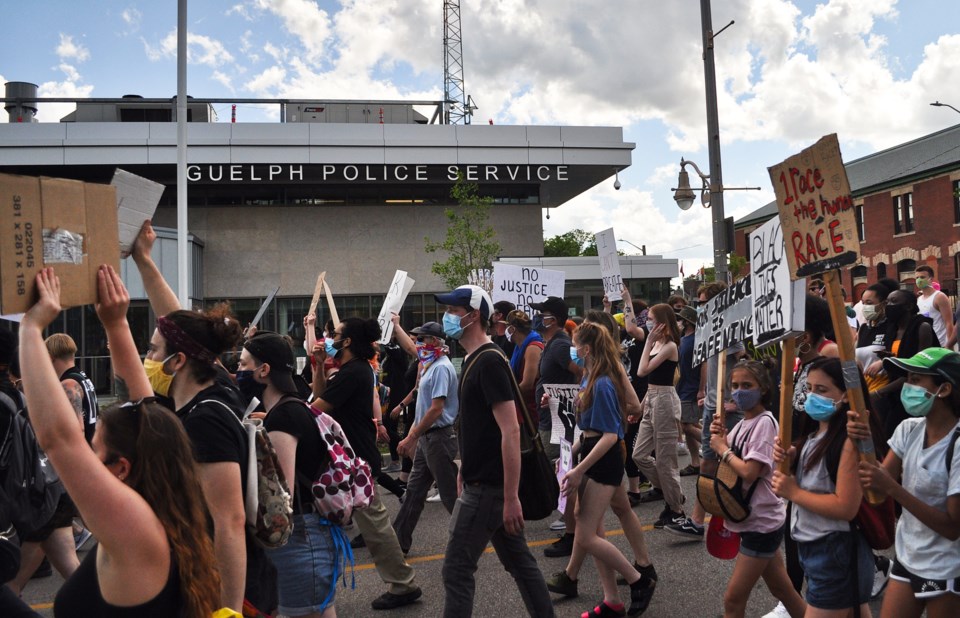We often joke in this era about how things that happened months ago sometimes feel like it’s been several years since they occurred.
For instance, did you know last week marked three years since George Floyd was killed on the streets of Minneapolis by a police officer while three other police officers stood by and watched it happen? The reaction was massive and immediate, and it stretched all the way to Guelph with thousands of people here taking to the streets to show support and solidarity for our Black community.
It was about a year after when unmarked graves started to be (re)discovered on the sites of old residential schools and thousand of people were in the streets again to stand with our Indigenous community members. The two events happening a year apart felt like a watershed. It felt like we would never go back.
Now I wouldn’t argue that we’ve gone all the way back, but I would also argue that in the mad scramble to get back to pre-COVID normalcy, we’ve kind of lost the thread on any other issue that was put on the table during the pandemic. Even the stuff that has nothing to do with COVID-19.
I was thinking about this as council discussed approving $260,000 in new funding for extra police patrols in downtown Guelph this week. It passed without much in the way of critical examination from council, and I can’t help but feel that this would not have been the case this time in 2020. Or 2021. Or a different post-COVID reality where those issues didn’t melt away from the popular and immediate consciousness.
Now, this is not to say that the money is unjustified, or that the extra patrols aren’t warranted, but it is sort of representative of pre-2020 thinking: We have a problem with safety, or the appearance of unsafety downtown, so who do we call? The police.
In the aftermath of the Black Lives Matter protests and the concerns about over-policing in the aftermath, it was often refrained that even police know that police are not the solution. But in a world with few options, when you need to call someone in an emergency and it’s three in the morning, who are you going to call? 9-1-1 doesn’t give you a list of options.
Acknowledging this was the first step, and it implied that there would be future steps, so what happened? We were supposed to start moving away from police as emergency responders for mental health crises and embrace new models, or perhaps fund the current models to their inevitable conclusions.
Obviously, this didn’t happen.
In fact, in three years it’s hard to think of any substantive change to our approach to the tangible issues of mental health, addictions and homelessness, let alone the intangible issues of systemic racism, equity of access, and bridging the gap between how different communities view police and policing.
Speaking for myself, I’m an 80s kids. I grew up in the 'Stranger Danger' era where it was always reinforced to us that if you felt threatened, or in danger, you can go to a person in uniform for assistance, but because I was white and middle class in a GTA suburb my experiences with police were minimal. Until pointed out, it would have never occurred to me that this is a privilege.
In other words, skepticism of police is never something I had to consciously confront, which is why the aftermath of Floyd’s killing was so powerful, and so dangerous, to the majority of the community that had a similar background to mine. It’s like being told that someone has those sunglasses from the movie They Live and sees a completely different world hidden from your point of view when they wear them.
Now that’s not to say that the police are universally bad either.
I was intrigued by some commentary during the Upper Grand District School Board’s review of school resource officers that said uniformed police officers are often recognized as trusted by students on the autism spectrum. In his book, Learning to Live, mental health advocate Noah Irvine talked about the police officer who randomly helped him get through some of his darkest times.
I don’t know how to answer these existential things, so I’ll focus on the political, and if there’s one thing that says we’ve really learned nothing in the last three years is that we still pay the invoice from police without much pushback, while nickel and diming those social services that might prevent the future needs of policing, and it happened again this week.
No matter your feelings about the ethos of 'defund the police,' the fact of the matter is that it’s very hard to do. Police have their own board, who refers their own budget to council, who can then fiddle with the numbers, as an oversight board should be able to do, only to get shutdown in a legal quagmire when the police board takes council to a third party arbitrator who almost always sides with the police.
Changing the system means actually changing the system, and while the current provincial government has shown great aplomb to change systems in the last year, it’s been rarely in the most helpful and direct ways. There’s been hardly any new money for healthcare, mental health, addiction treatments, a living wage, universal basic income, social housing or rent-geared-to-income housing, but hey, Peel Region won’t exist anymore in 19 months!! Cool.
For now, policing remains the only solution, not that it ever really was.
